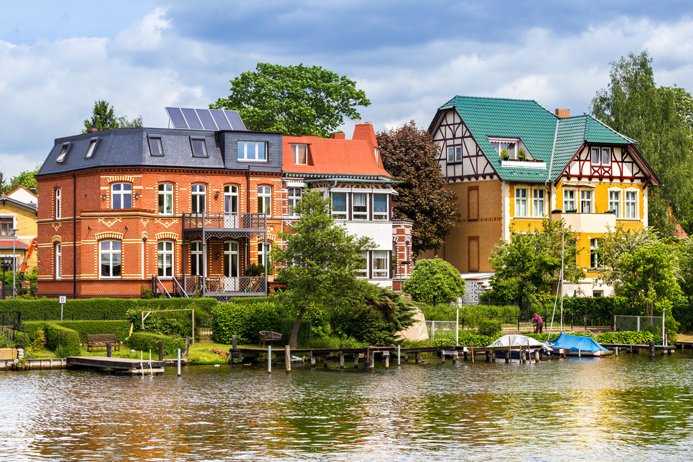What pitfalls are fraught with high yield?
 According to the data of the German Institute for Economic Research (Deutsche Institut für Wirtschaftsforschung), in every fourth case, real estate brings a zero return, and every twelfth investment is unprofitable. One of the most frequent reasons for unsuccessful investments is the pursuit of high returns. The profitability and risks of real estate investments are directly dependent: the higher the profitability of the object, the greater the risks, and vice versa.
According to the data of the German Institute for Economic Research (Deutsche Institut für Wirtschaftsforschung), in every fourth case, real estate brings a zero return, and every twelfth investment is unprofitable. One of the most frequent reasons for unsuccessful investments is the pursuit of high returns. The profitability and risks of real estate investments are directly dependent: the higher the profitability of the object, the greater the risks, and vice versa.
Low yield is less than 3%, medium – from 4 to 6%, high – 7% or more
Low returns are considered to be less than 3%, medium – from 4 to 6%, high – 7% and more peshkova / Depositphotos
According to George Kachmazov, managing partner of Tranio, a foreign real estate broker, this is easy to explain: the majority of investors are attracted by high-quality real estate in promising locations, because of high demand, it becomes more expensive, and its profitability decreases. “Thus, low profitability indicates demand for and high quality of the object. And, conversely, a high return on real estate means a risk of low liquidity, that is, there will be few people willing to purchase such an object, ”he concludes.
What other risks are fraught with “highly profitable” real estate?
Low occupancy rate
Objects with high profitability are often located on the outskirts of cities or in small towns, where 15–20 thousand people live. In Great Britain, there are such offers in villages in the north of England, far from London and other large cities, in Germany – in the economically weak Ruhr region or in the regions in the east of the country, where the unemployment rate is higher than the national average. In such places, the demand for rental is small, so the premises are often partially or completely empty. Even if the object is already being rented and at the time of sale brings a high income, it is likely that, in case of loss of the tenant, finding a new one for the same money will not be easy. “Therefore, we recommend investors to choose cities where there are large employers and the population is growing,” comments Ekaterina Raznikova, project manager for Tranio in Germany. “In Germany, these may be small cities, such as Augsburg or Ingolstadt.”
Pay attention to the reputation of the tenant company: in case of its bankruptcy, finding another tenant can be difficult
Pay attention to the reputation of the tenant company: in case of its bankruptcy, finding another tenant can be difficult. Iamway / Depositphotos
Temporary warranty
Sometimes management companies that are engaged in leasing objects promise investors a consistently high income, regardless of whether there are tenants in the premises or not – such projects should be viewed with suspicion. Typically, the management company deducts maintenance and management costs from rental income, offsetting the costs incurred during periods of inactivity due to revenue during rental periods. As a result, the investor should receive low, but stable and guaranteed profitability during the entire duration of the contract with the management company. And if she promises a high percentage, then, most likely, the conditions will not last long.
Often such objects are sold at an inflated price: parking or a hotel room is offered at a price 2-3 times higher than the real one, and the investor is guaranteed 10% per annum for two years
Often such objects are sold at an inflated price: parking or a hotel room is offered at a price 2-3 times higher than the real one, and the investor is guaranteed 10% per annum for two years logoboom / Depositphotos
A similar case is described on the website Retirement-planner.co.uk. An investor who wished to remain anonymous, invested £ 150,000 in warehouses in the UK with a guaranteed yield of 8% for two years. “Slightly less than a year later the management company ceased to pay profits,” he says. – I was informed that it was not possible to achieve the planned occupancy rate and profitability, but they are working on it. As for the promised buyback, then, as it turned out, it was possible only if the developer agreed to buy the object. When I inquired about the state of my investment and whether it was possible to sell the premises through a local commercial real estate agent, I was told that the object was not worth even a tenth of the money paid. ”
Expiring lease
High-yield properties are often sold if there are lease agreements that are nearing the end (2-3 years before the end of the lease term) or have already expired. So, at the beginning of 2017, an office with a 16% discount was offered near Liverpool: the seller could not find a buyer for a long time and reduced the initial price from 155 thousand pounds sterling to 130 thousand. The annual rental income was 14.5 thousand pounds a year. High profitability (more than 11%) in this case was due to high risks: a ten-year tenancy agreement was concluded with a law firm in 2007, so the object was sold with an agreement that has almost expired.


